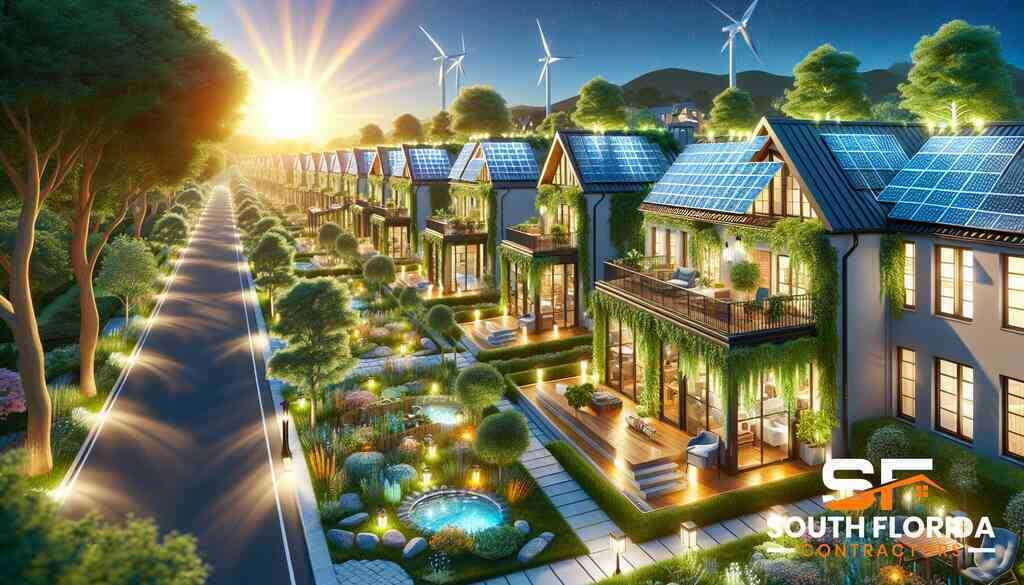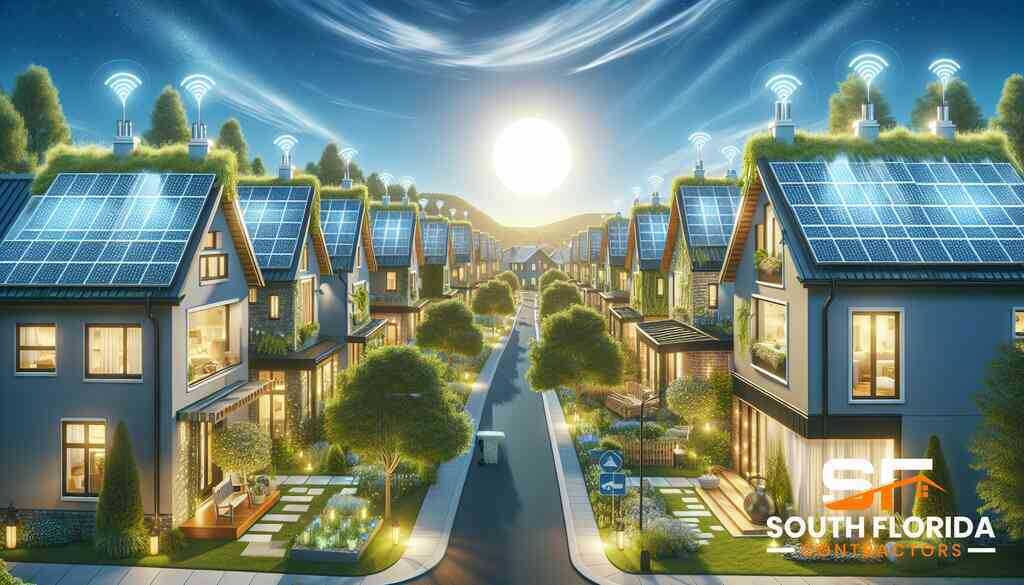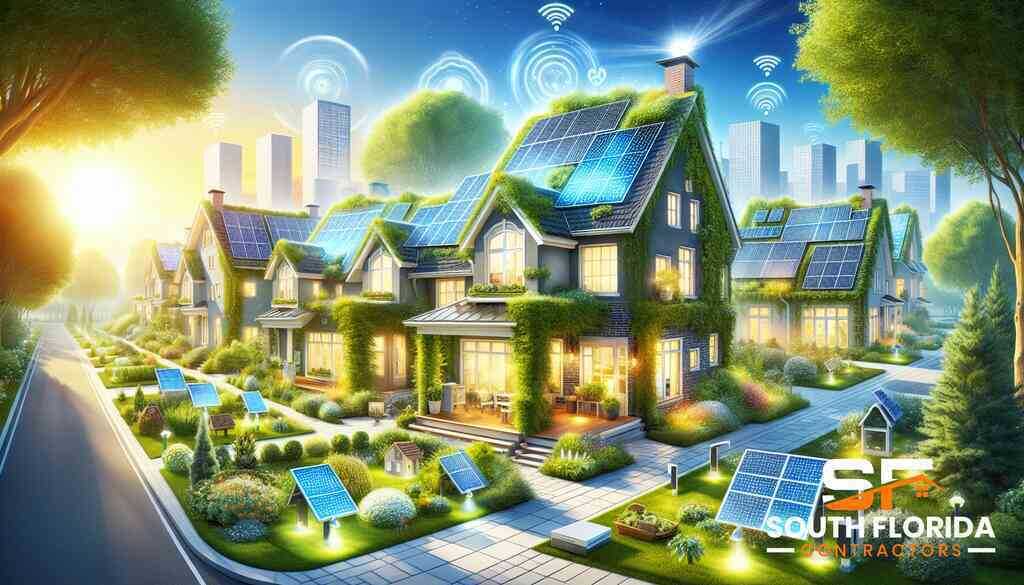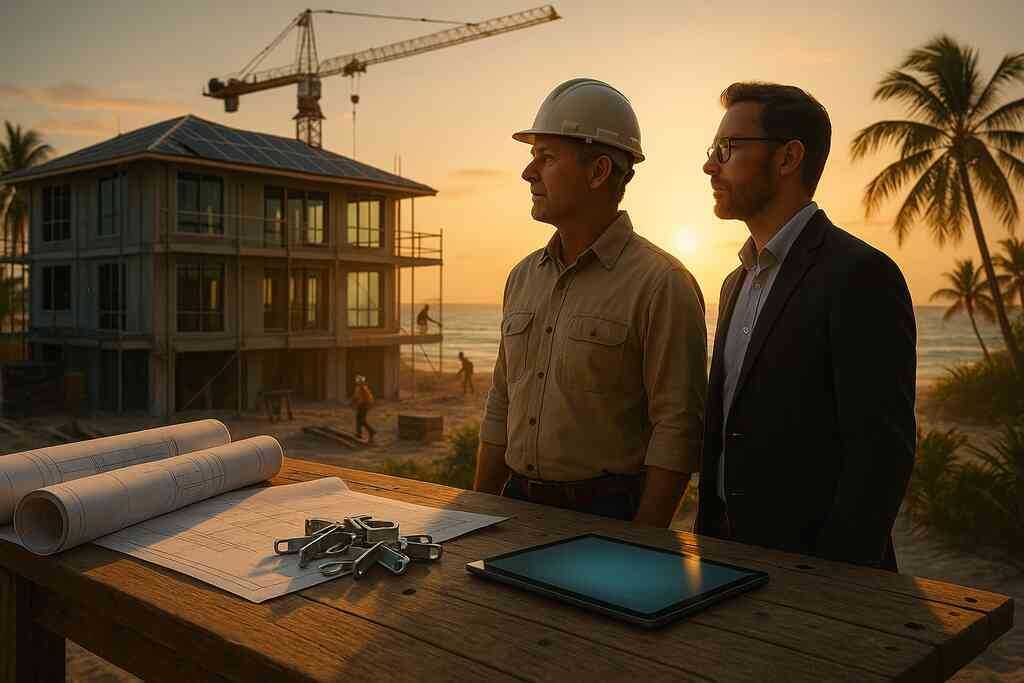
What is the Definition of Energy-Efficient Homes?
October 22, 2024
Illuminating the Concept: Understanding Energy-Efficient Homes
The Evolution of Sustainable Living
In recent years, sustainable living has emerged at the forefront of architectural innovation and design. The imperative drives this evolution from traditional construction to reduce environmental impact and promote responsible resource use. The incorporation of sustainable construction methods in design, such as eco-friendly building design, represents a significant shift towards greener practices. This systemic change is complemented by the rise of energy-efficient homes that embody principles of sustainability, resource efficiency, and healthier living environments.
As sustainable practices gain traction, the focus extends to holistic approaches. This means not only minimizing energy consumption but also ensuring that the entire lifecycle of buildings supports a reduced carbon footprint. By redefining construction norms and emphasizing the broader impact on ecosystems, these homes are at the heart of a sustainable future. The adoption of energy-efficient technologies is crucial as they provide the foundation for much of this transformative potential.
Energy Conservation Fundamentals
Energy conservation lies at the heart of energy-efficient homes, guiding the reduction of unnecessary energy usage through informed design and technology integration. By incorporating innovative energy-saving technologies like smart thermostats, advanced lighting systems, and cutting-edge insulation, energy demand is considerably minimized without sacrificing comfort. Technologies such as high-efficiency HVAC systems in South Florida play a crucial role in optimizing energy use and maintaining indoor comfort in varying climates, as detailed in How to maximize HVAC efficiency in South Florida?
The effective use of thermal insulation and strategically placed low-E window solutions in Florida further contribute to energy efficiency by regulating indoor temperatures and minimizing dependence on mechanical heating and cooling systems. This combination of intelligent design and technology fosters an environment where energy conservation isn’t just an ideal but a tangible reality, directly contributing to household savings and sustainability.
Analyzing the Benefits of Green Living
Green living offers a wide array of benefits extending beyond energy savings to encompass environmental, economic, and health aspects. Reducing reliance on nonrenewable resources through energy-efficient homes contributes to reduced carbon emissions, positively impacting climate change mitigation efforts. Additionally, such homes often benefit from renewable energy installation, such as solar panels, which provide clean, sustainable energy.
The economic benefits are equally compelling, with lower utility bills and increased property values associated with energy-efficient homes. Health benefits arise from improved indoor air quality, as these homes typically feature materials and systems that reduce pollutants and allergens in indoor spaces. In summary, the move towards energy-efficient homes is pivotal for cultivating a sustainable future, fostering economic resilience, and enhancing personal well-being.
The Blueprint of Efficiency: Key Features of Energy-Efficient Homes
Optimizing Thermal Insulation for Energy Savings
Thermal insulation is a cornerstone of energy-efficient home design, essential for maintaining optimal indoor temperatures and minimizing reliance on mechanical heating and cooling systems. By employing advanced materials and techniques, homes can significantly reduce heat transfer, ensuring energy is conserved efficiently. Selecting high-grade insulation materials such as spray foam, fiberglass, or cellulose requires thoughtful consideration of local climate conditions to maximize their efficacy. In the hot and humid atmosphere of South Florida, effective insulation can mitigate the sweltering heat, offering a haven of comfort and energy savings. Collaborating with South Florida Contractors ensures precise installation and choice of materials, making energy-efficient remodeling a straightforward and rewarding endeavor.
Integrating thermal insulation within walls, roofs, and floors can directly impact a home’s energy performance standards. Well-insulated homes balance reduced energy consumption, slash utility bills, and foster sustainable living. The synergy between insulation and green building materials elevates both environmental benefits and property value, turning efficient homes into valuable investments.
Harnessing the Power of Renewable Energy Sources
Embracing renewable energy technologies is a pivotal step towards achieving an energy-efficient home, seamlessly aligning with the principles of sustainable architecture. Solar panels, for instance, convert abundant sunlight into usable electricity, reducing dependence on conventional power grids. In sunny South Florida, a renewable energy installation can be particularly beneficial, utilizing solar power’s full potential to offset energy costs.
With the integration of solar water heaters, wind turbines, or hybrid systems, homes can transition towards self-sufficiency and potentially achieve net-zero energy status. By choosing appropriate renewable options, homeowners not only contribute to environmental preservation but also enjoy long-term financial returns. Partnering with knowledgeable South Florida general contractors can simplify the transition, ensuring that system installations are both efficient and effective.
Innovative Technologies: Smart Home Systems and Beyond
The integration of smart home systems in Delray Beach represents a leap forward in energy-efficient living, offering precision control over various home functions. Automation systems enable residents to monitor and adjust energy usage patterns, tailoring settings to personal preferences and peak efficiency times. Smart thermostats, for instance, refine climate control by learning user habits and optimizing heating and cooling cycles.
Beyond climate management, energy-efficient innovative systems extend to lighting, security, and appliances. LED lighting solutions, coupled with automated controls, reduce power use while maintaining optimal illumination. Advanced security systems provide peace of mind while being remarkably energy-efficient, utilizing sensors and cameras with low energy demands. These technologies not only enhance convenience; they contribute significantly to reducing a home’s carbon footprint, making them indispensable in the quest for sustainability. By leveraging these innovations, homeowners in South Florida can foster a lifestyle that perfectly balances modern comfort and environmental stewardship.

Designing for the Future: Construction Strategies for Energy Efficiency
Incorporating Eco-Friendly Building Materials
Incorporating eco-friendly building materials revolutionizes energy-efficient home construction, paving the way for a more sustainable future. Utilizing sustainable resources like bamboo, reclaimed wood, and recycled metal reduces environmental impact and supports healthier ecosystems. These materials, in conjunction with innovative design, enable builders to enhance thermal performance and maximize energy savings. The local climate and environmental conditions heavily influence material selection, especially for home builders in Florida, ensuring structures are both efficient and enduring. Embracing eco-friendly buildings in Palm Beach allows architects to create homes that are not only aesthetically pleasing but also harmoniously integrated with their surroundings.
The use of green building materials can directly lead to reduced energy consumption, a cornerstone of energy-efficient design. These materials often exhibit better insulation properties, which contribute to a stable indoor environment without excessive reliance on energy-intensive systems. Furthermore, they tend to have lower embodied energy, meaning less energy is consumed during their production and transportation processes. By strategically integrating these elements, construction companies create homes that align with the principles of sustainable living while offering long-term financial advantages. This shift towards eco-friendly materials marks a transformative step forward in cultivating net-zero building strategies that significantly decrease environmental footprints.
Passive Solar Design Techniques
Passive solar design techniques focus on the strategic harnessing of natural sunlight to optimize a building’s thermal performance without mechanical systems. This design methodology emphasizes the orientation and layout of a home to maximize solar gain in winter and minimize it in summer, effectively reducing the need for artificial heating and cooling. In South Florida, where sunshine is plentiful, these techniques become potent tools for optimizing residential energy efficiency. South Florida general contractors frequently employ passive solar strategies such as large south-facing windows, overhangs, and thermal masses to regulate indoor temperatures naturally.
The thoughtful implementation of passive design also includes window placement and glazing choices that exploit natural light while minimizing heat loss. Additionally, reflective roof surfaces and ample shade contribute to more relaxed indoor environments, further enhancing energy efficiency. Passive solar design techniques embody a harmonious blend of art and science, translating sustainable architecture trends into reality. By seamlessly integrating these principles, Delray Beach home builders can craft homes that resonate with the environment while offering enhanced comfort and reduced energy bills. This foresight in design not only meets stringent energy performance standards but also sets a benchmark for future-proof construction in South Florida.
Balancing Indoor Air Quality and Airtight Construction
Balancing indoor air quality with airtight construction ensures that energy-efficient homes maintain healthy living environments without compromising performance. An airtight home’s primary function is to prevent uncontrolled infiltration or exfiltration of air, thereby reducing energy loss. However, achieving this requires meticulous planning to ensure adequate ventilation, as poor air circulation can lead to indoor pollutant accumulation. By employing advanced mechanical ventilation systems with heat recovery, contractors maintain air quality while optimizing energy use.
High-efficiency filtration systems, alongside natural and mechanical ventilation strategies, are integral to this delicate balance and are one of the top 5 indoor air quality solutions. Technologies that regulate humidity and introduce fresh air into residential spaces prevent the buildup of allergens and volatile organic compounds. Sustainable architecture in South Florida often incorporates these systems, conforming to local climate demands while promoting wellness. South Florida general contractors recognize that understanding and implementing these components work harmoniously with airtight construction methods, securing both energy efficiency and occupant health.
Builders must also consider the use of non-toxic and low-emission materials during construction and finishing processes. These materials help maintain air purity and reduce health risks while adhering to eco-friendly practices. The intricate dance between maintaining quality air and ensuring energy fairness reflects a commitment to holistic home design, embodying the spirit of progressive and sustainable architecture. In this context, contractors near you transform contemporary homes into bastions of comfort, health, and sustainable living mastery.
Towards Sustainability: The Role of Energy Audits and Certifications
Understanding Energy Performance Standards
Energy performance standards are integral to the design and operation of energy-efficient homes, setting minimum requirements for energy use and efficiency levels. In South Florida, these standards guide contractors and homeowners in creating buildings that consume less energy while maintaining comfort. By adhering to these standards, builders ensure that new constructions and renovations achieve optimal energy efficiency. This not only reduces utility costs but also promotes environmental sustainability. Employing South Florida general contractors knowledgeable in energy performance standards ensures that your home meets these key benchmarks effectively. Collaborating with experts well-versed in eco-friendly practices helps bridge the gap between current performance and future efficiency goals, supporting the transition to sustainable living.
The Significance of LEED Certification
The Leadership in Energy and Environmental Design (LEED) certification represents a prestigious benchmark for the sustainability, efficiency, and eco-friendliness of buildings. For South Florida contractors, achieving LEED certification highlights commitment to superior construction standards and sustainable architecture. The certification process evaluates a range of factors, from site selection to water efficiency and material use, ensuring a comprehensive approach to building performance. Understanding the LEED certification’s importance equips homeowners and builders with the knowledge to enhance a property’s market value while minimizing environmental impact. By aiming for LEED certification, South Florida general contractors demonstrate dedication to cutting-edge practices, establishing homes as models of modern energy-efficient design that align with community and ecological needs.
Conducting Comprehensive Energy Audits for Homes
Conducting comprehensive energy audits is a pivotal step in identifying opportunities for improving a home’s energy efficiency. These audits provide a thorough assessment of energy use, highlighting areas where efficiency can be enhanced. In South Florida, energy audits involve a detailed examination of systems such as HVAC, lighting, insulation, windows, and appliances, ensuring they function optimally. Working with experienced professionals like South Florida Contractors can simplify this process, delivering insights that guide decisions on upgrades and modifications. Regular energy audits not only lead to significant cost savings but also contribute to a reduced carbon footprint, supporting broader climate action goals. This proactive approach enables homeowners to transition towards sustainable living practices seamlessly, aligning personal comfort with environmental responsibility.

Conclusion: Embracing the Energy-Efficient Revolution
The Path to a Reduced Carbon Footprint
Embarking on the journey toward energy-efficient homes signifies a pivotal step in reducing our carbon footprint. These homes utilize resources judiciously, minimizing reliance on fossil fuels and embracing renewable energy solutions such as solar panels and wind turbines. South Florida, with its abundant sunshine, offers perfect conditions for harnessing solar power, thus facilitating a transition to greener living. By integrating technologies like smart home systems and advanced insulation, homeowners can significantly cut down on energy consumption. These measures collectively contribute to a substantial decrease in carbon emissions, aligning with global climate action objectives. Additionally, embracing this sustainable approach sets a precedent for future developments, ensuring that energy-conscious design becomes the new norm in residential construction. The choices made today in energy-efficient living will reverberate through generations, casting a long shadow of environmental stewardship and responsibility.
Economic and Environmental Impact of Sustainable Living
The shift towards sustainable living is not only an environmental imperative but an economic opportunity. Energy-efficient homes typically boast lower operating costs due to decreased energy consumption, resulting in substantial savings on utility bills. Their resale value often exceeds that of traditional houses, making them attractive investments for environmentally conscious buyers. Moreover, utilizing materials such as low-E windows solutions in Florida further enhances energy conservation and comfort, enticing homeowners with both ecological and economic benefits. On a broader scale, the widespread adoption of energy-efficient practices fosters job creation within the renewable energy sector and stimulates local economies, especially in regions like South Florida. The twin forces of environmental preservation and economic growth ensure that sustainable living is as practical as it is imperative. By choosing this path, homeowners not only improve their well-being but also contribute positively to global sustainability goals.
Frequently Asked Questions
Question: How do energy-efficient homes contribute to reducing energy consumption in South Florida?
Answer: Energy-efficient homes are designed to significantly reduce energy consumption through innovative technologies and strategic construction techniques; check out The Next Generation of Energy-Efficient Designs Explained. By incorporating high-efficiency HVAC systems, advanced thermal insulation, and smart home systems, these homes minimize energy loss and optimize consumption. Moreover, utilizing renewable energy sources such as solar panels further reduces reliance on nonrenewable energy, aligning with the principles of sustainable living. In South Florida, where the climate is warm, these energy-saving technologies become indispensable, providing comfort and cost savings year-round. South Florida Contractors offer expertise in installing these systems, ensuring that your home meets the standards for energy efficiency.
Question: What role do eco-friendly building materials and passive solar design play in energy-efficient homes?
Answer: Eco-friendly building materials and passive solar design are crucial components of energy-efficient homes. Materials like bamboo and recycled metals reduce environmental impact and enhance a building’s thermal performance. This results in lower energy consumption by retaining optimal indoor temperatures, enhancing the importance of eco-friendly building materials. Passive solar design techniques utilize the sun’s position to maximize heating in winter and cooling in summer, reducing reliance on artificial systems; visit What Does a Green Home Mean in South Florida. Together, these strategies decrease a home’s carbon footprint and promote sustainable architecture. South Florida Contractors specialize in integrating these elements into your home, balancing aesthetics and functionality for a green living space.
Question: In the blog post ‘What is the Definition of Energy-Efficient Homes?’, how are smart home systems and airtight construction emphasized?
Answer: In the blog post ‘What is the Definition of Energy-Efficient Homes?’, smart home systems and airtight construction are highlighted as essential features for enhancing energy efficiency. Smart home systems allow homeowners to manage and monitor energy use precisely, ensuring heating and cooling are optimized. Features such as smart thermostats and LED lighting solutions contribute to significant energy savings; dive into What Does Smart Lighting Installation Involves. Airtight construction prevents unwanted air infiltration, maintaining indoor comfort without excessive energy use. By employing these technologies, South Florida Contractors ensure that homes are efficiently designed to balance energy use and indoor air quality, making them leaders in residential construction.
Question: Can renewable energy sources make homes entirely self-sufficient, and how can South Florida Contractors assist?
Answer: Yes, renewable energy sources have the potential to make homes entirely self-sufficient. What Are the Benefits of Solar Panels in Florida? Through the installation of solar panels and hybrid energy systems, homes can generate their electricity, significantly reducing the need for external power sources. In sunny South Florida, harnessing solar power is particularly effective, enabling homes to achieve net-zero energy status. South Florida Contractors are well-versed in renewable energy installations, providing customized solutions that capitalize on the local climate; check out Top Solar Trends in Palm Beach County. By trusting their expertise, homeowners can embark on a journey towards sustainable living, ensuring their residences are both economically and environmentally beneficial.
Question: How do comprehensive energy audits offered by South Florida Contractors enhance energy efficiency in homes?
Answer: Comprehensive energy audits are vital for enhancing a home’s energy efficiency. These audits provide an in-depth assessment of a home’s energy use, identifying critical areas for improvement such as insulation, HVAC systems, and lighting; see more on Top 10 HVAC Optimization Strategies for South Florida. By working with South Florida Contractors, homeowners gain access to expert insights and recommendations for upgrades that improve energy performance. Regular audits not only lead to significant cost savings by reducing utility bills but also contribute to reducing the home’s overall carbon footprint. The audit process is essential for maintaining high energy performance standards and ensuring sustainable living practices are met consistently.


